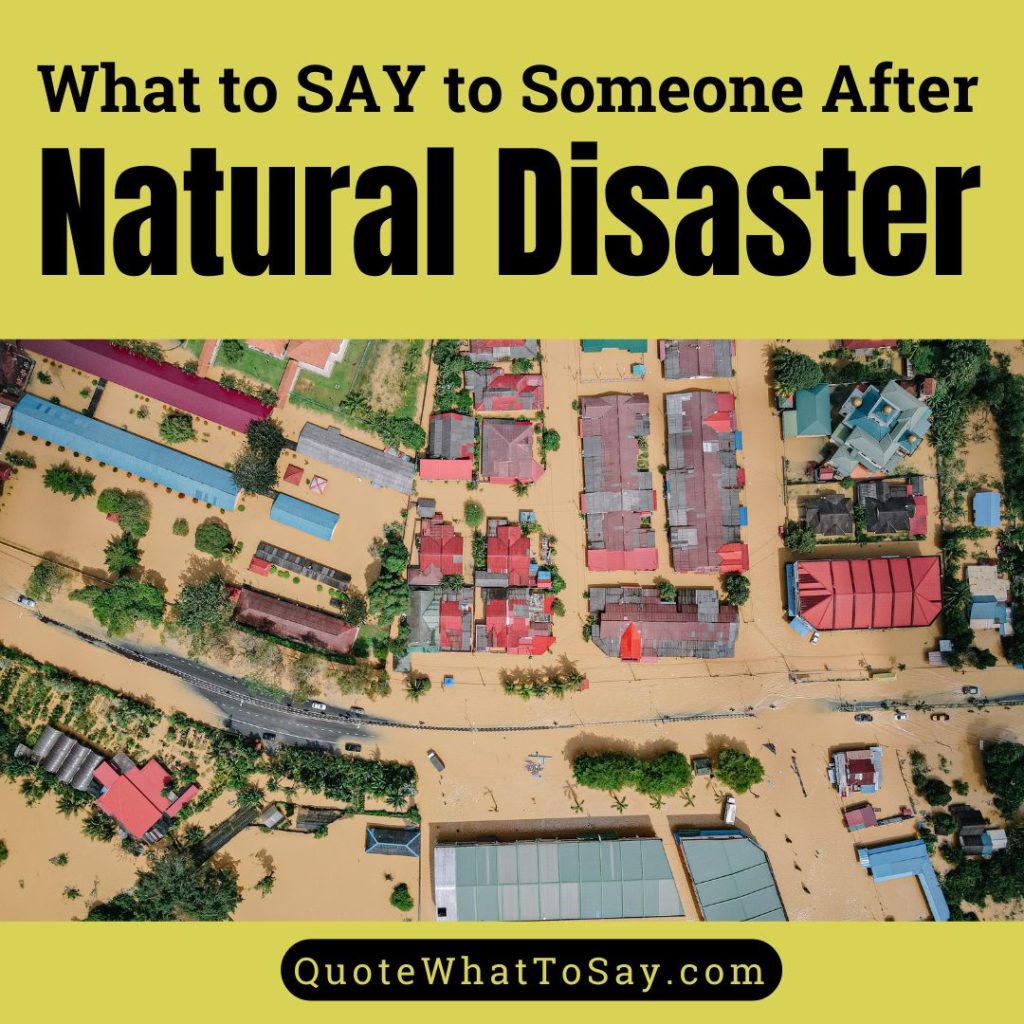In the aftermath of a natural disaster, finding the right words to say to someone affected can feel overwhelming.
You want to offer comfort and support, but it is easy to worry about saying the wrong thing.
However, showing empathy, offering practical help, and being a listening ear can make a big difference to someone who is struggling after going through a natural disaster such as flood, earthquake, Hurricane, severe thunderstorms, wildfire, etc.
In this post, we will explore 113 thoughtful things to say – and actions to take – that can provide genuine support to the victims during such a difficult time.

What to Say to Comfort Someone After a Natural Disaster
“I’m so grateful you are safe.”
“It’s okay to feel overwhelmed.”
“I wish I could take away your pain.”
“I’m thinking of you and your family.”
“Your safety is what’s most important.”
“I’m so sorry you’re facing this situation.”
“You don’t have to go through this alone.”
“Take all the time you need to process this.”
“I’m so sorry for what you’re going through.”
“I can’t imagine how hard this must be for you.”
“You’ve got a lot of people who care about you.”
“You’ve been through so much; it is okay to rest.”
“It’s okay if you don’t feel like yourself right now.”
“It’s okay if you are not ready to talk about it yet.”
“You’ve already been so brave through all of this.”
“You are not alone, even when it feels like you are.”
“You are allowed to feel upset, angry, or frustrated.”
“Let me know if you need a break from everything.”
“It is completely normal to feel how you are feeling.”
“You’ve made it through the worst; now it’s time to heal.”
“It’s okay to feel shaken, but know that you are still standing.”
“Don’t worry about anything, just focus on yourself right now.”
“There’s no right or wrong way to feel after something like this.”
“How are you feeling today? No pressure to talk, just checking in.”
“You’re not expected to be ‘okay’ right now. Take the time you need.”
“You don’t have to worry about anything other than healing right now.”
Natural Disaster Messages of Support – Flood, Earthquake, Hurricane, Wildfire etc
“I’m just a phone call away.”
“I’ll run errands for you if that helps.”
“If you need to talk, I’m here to listen.”
“I’m here for you, whatever you need.”
“Is there anything you need right now?”
“Do you need a place to stay for a while?”
“I’m sending you all my love and support.”
“I’ll be by your side every step of the way.”
“I’ll check in on you regularly if that’s okay.”
“It’s okay to ask for help when you need it.”
“I’ll be here for the long haul, not just today.”
“Let me help you with cleaning up, if you need.”
“Would it help if I brought over some supplies?”
“I wish I could be there in person to support you.”
“If you need to cry or scream, I’m here for that too.”
“I’m here to help with whatever is weighing on you.”
“I’ll help you sort through things when you’re ready.”
“I’ll support you in rebuilding, however long it takes.”
“Can I help connect you with local aid organizations?”
“Is there anyone else you’d like me to contact for you?”
“I’m here whenever you need me, no matter the time.”
“I’m here to sit with you, even if you don’t want to talk.”
“You are incredibly resilient, but it’s okay to ask for help.”
“I’ll keep checking in, but feel free to reach out any time.”
“Do you need any help with childcare or other responsibilities?”
“I’ll take over some tasks for you until you’re back on your feet.”
“If you need a distraction, I’m happy to spend some time with you.”
“I’m bringing over some groceries so you don’t have to think about it.”
“I’m bringing over some meals; I don’t want you to worry about cooking.”
“You are not alone in this. Let me know if there is anything I can do to help.”
Words of Encouragement After a Natural Disaster
“You are stronger than this storm.”
“Every small step forward is progress.”
“You’ve already shown so much strength.”
“I know this is tough, but I believe in you.”
“Your courage in the face of this is inspiring.”
“Don’t forget how far you’ve come already.”
“Trust that you will find peace after this storm.”
“Believe in your ability to overcome and rebuild.”
“You’ve got this, even when it feels overwhelming.”
“You are capable of handling whatever comes next.”
“You are doing the best you can, and that is enough.”
“You are more resilient than the disaster that struck.”
“You will rise from this, stronger and wiser than before.”
“You’ve already shown incredible courage – keep going.”
“You are doing your best, and that’s all anyone can ask.”
“Your courage and determination will carry you forward.”
“You are resourceful and will find your way through this.”
“There is no rush to ‘move on’ from this – take your time.”
“The sun will shine again, and you will be standing strong.”
“You have the strength to rebuild your life, piece by piece.”
“Even when it feels impossible, you are making it through.”
“It’s okay to take breaks and recharge you are doing great.”
“You are doing an amazing job, even if it doesn’t feel like it.”
“You’ve weathered this storm, and brighter days are ahead.”
“You have the power to rebuild your life, one step at a time.”
“You’re capable of finding hope even in the darkest of times.”
“You are a survivor, and you’ll come out of this even stronger.”
“Your resilience will carry you through even the toughest days.”
“You’ve gone through so much – let’s take it one step at a time.”
“You are capable of turning this hardship into a story of strength.”
“You’ve already made it through so much, and you will keep going.”
“You are stronger than you think, but it’s okay to lean on others too.”
“You are not expected to handle this perfectly. Just take it step by step.”
“You are not expected to have all the answers right now. Trust yourself.”
“Even when things feel uncertain, you have the strength to move forward.”
“It’s okay to ask for help – sometimes, that is the bravest thing you can do.”
“One day at a time – you are making it through. Take things at your own pace.”
Sympathy and Condolence Message for Natural Disaster
“I’m so sorry for your loss.”
“It’s okay to grieve what you’ve lost.”
“I’m so sorry for everything you’ve lost.”
“This must be incredibly hard. I’m so sorry.”
“I’m praying for you and everyone affected.”
“You are in my prayers during this difficult time.”
“I’m so sorry for all you’ve lost during this difficult time.”
“You are incredibly strong, but you don’t have to be strong all the time.”
“My heart is heavy with sympathy for everything you are going through.”
“Sending you my deepest sympathies as you cope with this terrible event.”
“I’m truly sorry for the devastation you’ve endured. My thoughts are with you.”
“Please accept my deepest condolences for the hardship you are going through.”
“I’m so sorry for your losses and the hardship you’re facing. You are not alone in this.”
“I’m so sorry for the losses you’ve faced. I’m thinking of you and sending you strength.”
“My sincerest condolences for the tragedy that’s affected your life. You are in my heart.”
“I’m heartbroken for you and your family. If there’s anything I can do, please let me know.”
“I am deeply sorry for the loss and devastation you’ve experienced. My heart goes out to you.”
“Words can’t express how sorry I am for the destruction and loss. Please know I’m thinking of you.”
“My heart goes out to you for the suffering you’ve endured. Please take care, and I’m here for you.”
“My deepest sympathy for the difficult time you are going through. I’m holding you in my thoughts.” “I’m so sorry for the challenges you are facing after the disaster. My heart goes out to you and your loved ones.”
How To Help Victims of Natural Disasters
Helping victims of natural disasters can be incredibly impactful and involves various forms of support, from immediate relief efforts to long-term recovery assistance.
By offering time, resources, or emotional support – you can make a meaningful difference in the lives of those impacted by a natural disaster.
Always ensure your efforts are directed through reputable channels to have the most effective impact.
Here are several ways you can help:
1. Donate to Relief Organizations
– Monetary Donations: Financial contributions to established organizations like the Red Cross, UN Disaster Relief, or local charities can provide immediate assistance in the form of food, shelter, and medical care.
– Supply Donations: Check local or national organizations for specific needs such as non-perishable food, clean water, hygiene products, blankets, and clothing.
2. Volunteer Your Time
– On-Site Help: If you are local or have the necessary skills, you can volunteer to help with recovery efforts, including search and rescue, medical aid, or rebuilding homes.
– Remote Volunteering: Many organizations need help coordinating relief efforts, managing communications, or raising awareness, which can often be done remotely.
3. Provide Shelter
– Offer Temporary Housing: If you live in a nearby, unaffected area, consider offering your home as temporary accommodation for displaced individuals or families.
– Connect with Housing Programs: Many relief organizations coordinate housing for victims and may be able to direct you on how to get involved.
4. Fundraise
– Organize Community Drives: Host a fundraiser or donation drive to collect money or supplies for victims of the disaster.
– Online Campaigns: Use crowdfunding platforms like GoFundMe to raise funds, ensuring the proceeds go to victims or reputable organizations.
5. Assist with Clean-Up and Rebuilding
– Debris Removal: After the initial impact of a disaster, victims often need help clearing debris from homes and roads.
– Rebuilding Homes: Organizations like Habitat for Humanity offer volunteer opportunities to help rebuild homes for those who lost theirs.
6. Provide Emotional Support
– Offer Emotional Care: People affected by natural disasters often face negative mental health consequence such as depression, anxiety, post-traumatic stress disorder (PTSD), and others. If you are trained in counseling or mental health services, offering support or connecting them to therapists can be invaluable.
– Be a Listener: Sometimes, simply being there to listen and provide a shoulder to lean on can help victims process their grief and fear.
7. Help with Childcare or Pet Care
– Childcare Services: Offer to care for children while parents focus on dealing with their recovery efforts.
– Foster Pets: If victims have lost their homes and cannot care for their pets, fostering animals temporarily can provide a safe haven.
8. Donate Blood
– Give Blood: After disasters, blood supplies can be critical, especially in areas with many injuries. Donating blood to local hospitals or blood banks can save lives.
9. Support Local Businesses
– Shop Local: In disaster-affected areas, supporting local businesses can help them recover financially, allowing the community to rebuild more quickly.
– Organize Business Relief: Start initiatives to help small businesses reopen by contributing funds or offering services they need.
10. Advocate for Policy Changes
– Promote Preparedness and Resilience: Advocate for better infrastructure, disaster preparedness, and climate resilience programs to reduce future vulnerabilities.
– Raise Awareness: Educate others about how to help disaster victims and encourage long-term support, not just immediate aid.
11. Offer Transportation
– Provide Rides: Many victims may have lost their vehicles and need help getting to shelters, aid centers, or medical facilities.
– Carpool for Volunteers: Assist other volunteers by organizing carpools to affected areas.
12. Donate to Mental Health and Trauma Services
– Support Trauma Recovery Programs: Help fund organizations that provide mental health services to disaster victims suffering from PTSD or anxiety.
13. Engage in Long-Term Recovery Support
– Sustained Donations: Often, victims need long-term financial and logistical support well after the initial disaster has passed. Keep giving or volunteering over time.
– Advocate for Rebuilding Efforts: Stay engaged in rebuilding communities and homes after the initial disaster response ends.
14. Support Local or Regional Relief Efforts
– Stay Local: Consider donating to or volunteering with local organizations directly involved in relief efforts, as they are often most familiar with the community’s needs.
– Attend Community Meetings: Participate in local disaster relief discussions to stay informed about how you can help over the long term.
15. Share Accurate Information
– Spread Awareness: Use your social media platforms or community outreach to share verified ways to help and provide updates on how recovery efforts are progressing.
– Combat Misinformation: In times of crisis, rumors and misinformation can spread quickly. Ensure you share accurate, helpful information from credible sources.





No Responses